Thukten Zangpo
The Economic Development Board (EDB) has finalised 10 members out of which 40 percent constituted representation from the private sector, including the Bhutan Chamber of Commerce and Industry (BCCI).
This is according to the Minister of Industry, Commerce and Employment (MoICE), Namgyal Dorji.
He added that, initially, only two local experts were to be included as members of the EDB as per the executive order. However, the minister said that the second EDB meeting decided to take in an additional local expert as a member for more representation from the private sector.
Currently, the board has four members from the private sector.
The EDB was established on January 29 with the primary mandate to attract foreign investors to enhance foreign investments in large, medium, cottage, and small industries.
The Department of Industry under the MoICE functions as the Secretariat to the EDB.
Since its inception, two EDB meetings have been conducted so far. The first meeting was held on February 20 where EDB’s terms of reference and members to the EDB was finalised.
The decision was also made to hold the EDB meetings on the 21st of every month, regardless of government holidays and weekends.
The second meeting held on April 2 finalised three local experts from the six nominations received as members while two international experts were finalised as advisors from the three nominations received because of their busy schedules and time difference.
The second meeting directed the Economic Cluster to review the revised foreign direct investment (FDI) Policy and Regulations submitted by the MoICE to EDB and to submit to the Cabinet by the end of April this year.
During the third EDB meeting held on April 21, the prime minister expressed the Board’s role as a one-stop single point for facilitating and promoting FDI. He expressed the need to seek potential investors in targeted areas.
The FDI policy and rules and regulations are expected to be completed and submitted to the Cabinet by April-end.
The EDB comprises ten members, including the Prime Minister as chairperson, Minister of Finance, Minister of Industry, Commerce and Employment, the Secretary of Ministry of Energy and Natural Resources, Secretary of Ministry of Industry, Commerce and Employment, the Director of the Office of the Cabinet Affairs and Strategic Coordination in the Prime Minister’s Office, the President of the Bhutan Chamber of Commerce and Industry, Chairman of Yangphel Private Limited (local expert) Ugyen Rinzin, Founder and Director of Royal Thimphu College and Promoter of Exalt Ferro Alloys Private Limited (local expert) Tenzing Yonten, and Managing Director of the Karma Group (local expert) Karma Dorji.
The private sector expressed concerns about under-representation on the Board and that their opinions would not be heard with a majority of the members from the government.
He added that the real economic players involved in economic activities in private and corporate sectors should be considered as members on the Board. “Bureaucracy does not produce, bureaucracy consumes.”
An economist, Dr Chandra Dhakal, said that the 13th Plan was about leveraging the private sectors and to achieve the target of a high-income economy, the private sector should not be neglected.
He added that the Board should identify challenges and opportunities experienced by the private sector.


